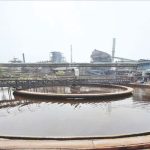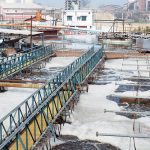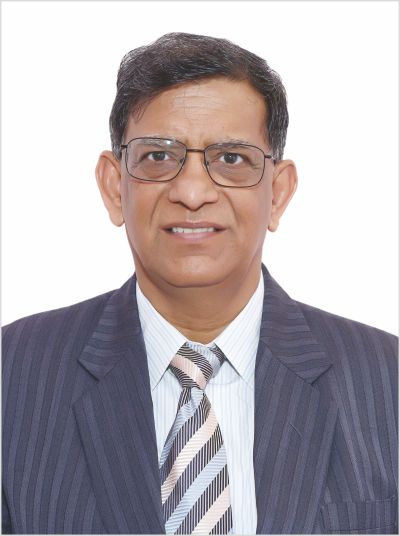
Kuantum Papers’ commitment to a sustainable future is underpinned by its focus on social farm forestry initiatives, water conservation and waste management strategies. “Over 90% of our machine water is recycled, serving various purposes such as wet washing of agro raw materials, clarifying machine water and reuse within the pulp mill bleach plant showers and machinery itself for cleaning and dilution purposes,” Mr. Sushil Kumar Khetan, its Chief Executive Officer – Operations, informs Paper Mart.
Paper Mart: How do you ensure water efficiency in your operations?
Sushil Kumar Khetan: At Kuantum Papers, we are driven by the philosophy of ‘Circular Economy’ in our operations i.e. recycling, reusing and regenerating the resources to achieve our objectives. These principles form the ethos of our processes, right from using agro residues and veneer waste and wood chips from sustainable sources as our raw material, using biomass in our power boilers, chemical recovery and reuse and recycling of pulp making chemicals and water.
We recognise the significance of water as a resource and have taken proactive steps to reduce its consumption. We continue to invest in the latest freshwater conservation technology and wastewater treatment processes to protect the environment and ensure the sustainability of our paper operations. We have recently installed High-Rate Solid Contact Clarifiers (HRSCC) for machine water and wet washing of Agro raw materials, enhancing water circulation in our paper machines and pulp mills. Additionally, we have deployed Multi Plate Settlers (MPS) units and Disc filters to maximize water circulation and minimize wastage.
We have also set up closed-loop systems for showers and cleaning systems in our pulp mills and paper machines to further reduce the need for freshwater and minimize wastewater generation.
At the heart of our operations lies a commitment to continuous innovation and operational excellence. We continuously evaluate and optimize our processes to identify opportunities for improvement and innovation, ensuring that we operate sustainably while meeting the needs of our stakeholders.
PM: What has been the reduction in your water consumption over the years?
SKK: Overall, our water conservation initiatives have resulted in a reduction of 15% water consumption in the last 3 years. Specifically, we have managed to decrease our water consumption by 6 m3 per ton of paper in the last year itself.
The company has a vision to reduce its water consumption by 35% in the next 2 years, through focused efforts and initiatives led by our Water Savings Committee.
Watch: Top Paper Companies 2023
PM: What percentage of water consumed is recycled, and where is the discharged water reused?
SKK: Over 90% of our machine water is recycled, serving various purposes such as wet washing of agro raw materials, clarifying machine water and reuse within the pulp mill bleach plant showers and machinery itself for cleaning and dilution purposes. The equipment sealing water is collected in separately built return pipes and used multiple times in all the production units, with 80% of the sealing water being recycled. We have built recycling units, collection pits and clarifiers at various stages, where the water is recycled 8-10 times before being purged for treatment.
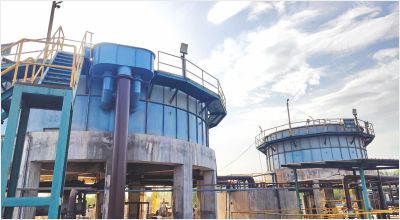
Kuantum has a state-of-the-art ETP from which the treated water is discharged for the purpose of irrigation in the fields of the surrounding villages. We have been supplying this water to 2000+ acres of land through a network of almost 15 km of pipelines and 5 pump sets for farming. We are committed to supporting our community of farmers and have supplemented their livelihood by providing a reliable source of water for their crops.
We have been supplying this water to 2000+ acres of land through a network of almost 15 km of pipelines and 5 pump sets for farming. We are committed to supporting our community of farmers and have supplemented their livelihood by providing a reliable source of water for their crops.
PM: What innovative solutions have you introduced in different areas of your mills that have made them more water efficient?
SKK: In order to reduce freshwater consumption, the company has deployed advanced technologies at its plant.
- Kuantum has received approval from the Govt. of Punjab to utilise surface water from the canal. From May 2024 onwards, we have started our endeavour of replacing groundwater consumption with surface water which has already reached a level of 40%.
- Under the freshwater reduction initiatives, High-Rate Solid Contact Clarifiers (HRSCC) have been installed for the treatment of paper machine backwater. The HRSCCs help to remove suspended solids and this clarified water is then used at our pulp mill and paper machines, resulting in savings of 1450 m3 of freshwater per day.
- All Paper machine drains water collected and clarified in save-all followed by MPS unit to achieve water with TSS of less than 30 ppm and used for ETP belt press, board machine and chemical additive preparations. This initiative resulted in freshwater savings of 1000 m3/day w.e.f Q4 2023.
- Installation of new state-of-the-art Dissolved Air Floatation (DAF) technology viz. Megacell high-performance filter which is especially used for wet washing filtrate to achieve outlet TSS levels < 300 ppm followed by triple wire sludge dewatering press for sludge handling.
- The mechanical sealing water is being collected and used at Belt filter press cleaning showers leading to a saving of 400 m3 of fresh water per day.
- Installation of condensate polishing unit resulted in savings of 300 m³ of water.
- Chilled water saved for absorbing ClO2 in absorber by 280 m3/day by increasing CLO2 solution strength from 9 gpl to 11 gpl.
- Saving of 150 m3/day Soft water + DM water by recirculating sealing water of pumps in ClO2 plant.
- Machine cleaning shower nozzles changed and modified to reduce freshwater consumption.
PM: What is your water usage reduction target? How do you plan to achieve it?
SKK: Our vision is to achieve the water consumption benchmark of less than 30 m3/T of paper by 2027. The team at Kuantum Papers is targeting further reduction of freshwater consumption by:
Installation of twin drum roll press at a pulp mill to reduce the water usage by 3 m3/Ton of paper by the end of Q2 2024.
- Usage of canal water which has lower hardness has provided flexibility in the operations to replace groundwater and thus optimisation in the softening plant operation.
- Utilisation of treated water for wet washing in place of machine recycled water by doing further clarification/filtrations for use at additional showers and dilutions in a paper machine.
- Exploring the options of new and innovative technologies like electrocoagulation / RO / Ultrafiltration techniques at the targeted water sources, which are having comparatively fewer contaminants and result in good, recycled water for utilization in process and auxiliaries.
- Continual focus:
1. The water savings committee which consists of cross departmental teams continues to focus on water saving initiatives. Exposure of the team members to internal trainings/external trainings on new technologies and innovative methods in partnering with various consultants, chemical suppliers, and industry specialists.
2. Continuously exploring the new technologies that are available to make water saving systems stronger without compromising the quality of product and effluent treatment operations. - Supporting and investing in water conservation activities with a long term vision and “future ready” method.
Also Read: Bindals Papers: Reducing Water Consumption at Source
PM: What are the challenges you often face in making your mills water efficient?
SKK: Water efficiency is the cornerstone of sustainability in our mills. However, this pursuit comes with its own set of challenges. Increased water recycling cycles lead to higher concentrations of suspended solids in the water. This water can compromise the quality of clarified water, ultimately limiting the amount we can recycle and forcing us to rely more on fresh water. To address this, we have invested in advanced clarification technologies like Micro Plate Settlers (MPS) and High Rate Sedimentation Clarifiers (HRSCC). These systems effectively remove suspended solids, allowing us to recycle more water while maintaining its quality.
Another challenge lies in the potential for production disruptions. Heavily high suspended solids in recycled water can clog nozzles, impacting both output and paper quality. To overcome this problem, we have successfully reduced Total Suspended Solids (TSS) to less than 50 ppm in all our machine water. This cleaner, more reliable flow allows us to utilize recycled water directly in our production line and bleach washer’s line without encountering clogging issues.
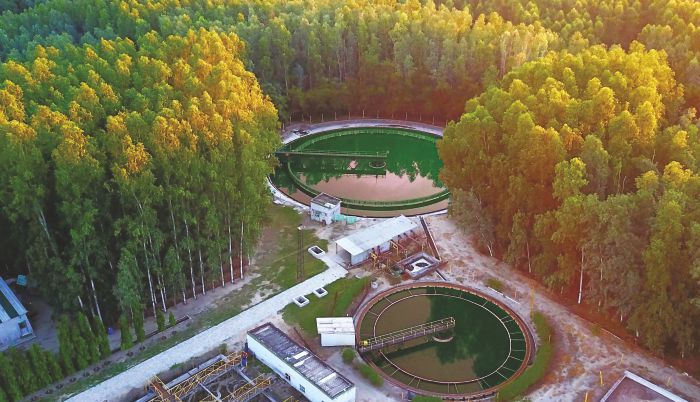
Sometimes limited water holding capacity can also create bottlenecks in treatment and process control. To address this, we have constructed large whitewater clarifiers in phases, followed by the implementation of MPS systems. This robust infrastructure enables us to efficiently recycle over 90% of our machine water.
There is also an increase in scaling tendency due to the close looping of water, which is being mitigated by the use of anti-scalant in critical areas. Wet end chemistry is also required to be optimised to have proper retention of chemicals and strength of the paper. We are actively engaging with specialty chemical and equipment suppliers to smoothen our operations. Chemicals like charge controllers and improved retention aids are being used to ensure quality and efficiency.
At Kuantum Papers, a commitment to continuous improvement lies at the heart of our approach to water conservation. Through strong research and development initiatives and strategic investments in infrastructure, we are constantly striving to minimize water usage and ensure a sustainable future.


